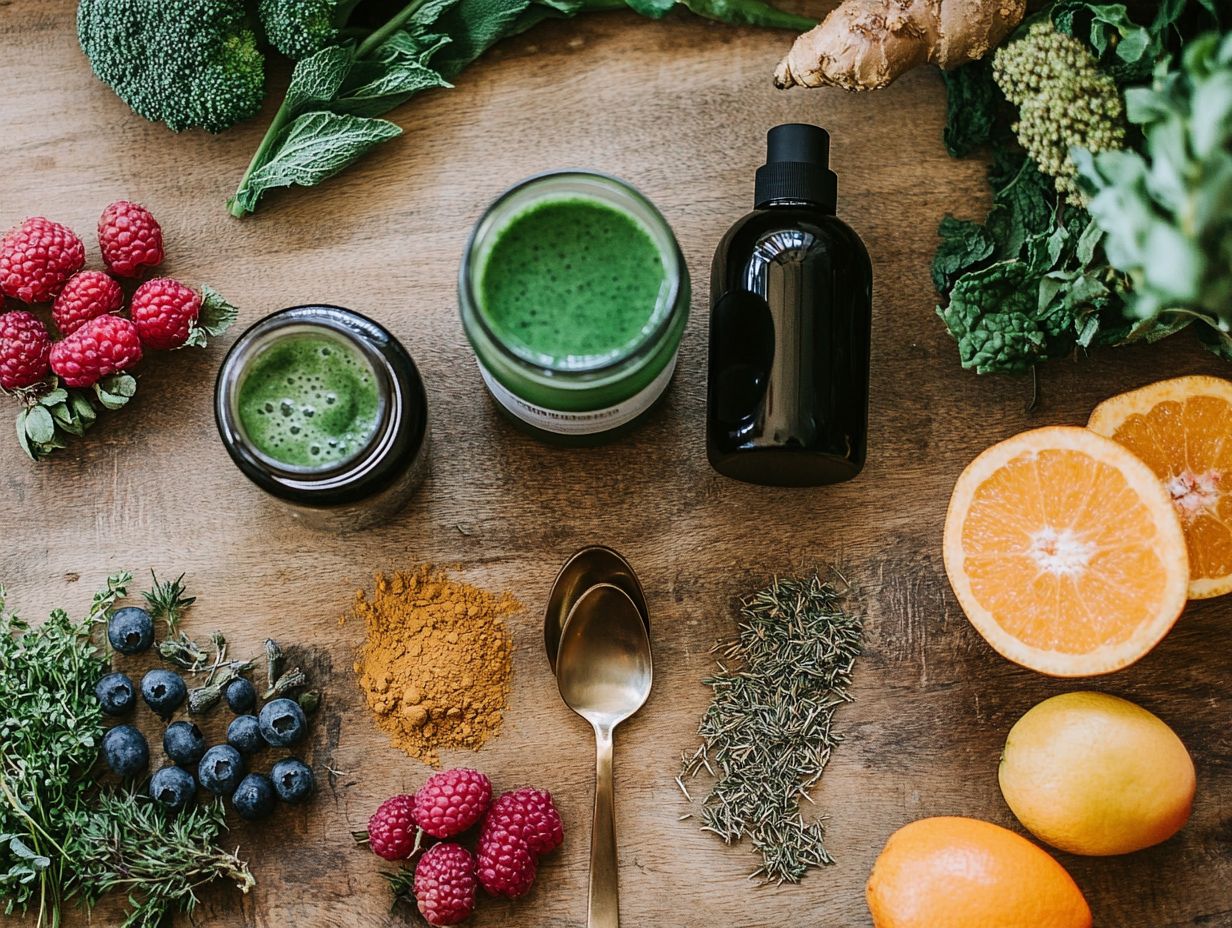In recent years, I have observed a significant increase in attention towards adaptogens and their potential health benefits, both internally and externally. These natural substances, known as plant adaptogens, derived from plants, are promising in their ability to help the body adapt to stress and promote overall well-being. This article aims to explore their role in skincare and smoothies, emphasizing the advantages they can provide for both skin health and general wellness, as well as their potential impact on skin diseases such as acne and psoriasis. Additionally, I will address the ongoing debate regarding their efficacy: are adaptogens simply a passing trend, or do they offer sustainable solutions due to their unique phytochemical structure? I invite you to join me as I delve into the science and potential of these powerful ingredients.
Key Takeaways:
Understanding Adaptogens

I recognize that adaptogens are natural substances, primarily sourced from plants, that assist the body in resisting various types of stressors, including physical, environmental, and emotional challenges.
These herbal remedies, featuring well-known adaptogens such as Ashwagandha, Ginseng, Rhodiola, and holy basil, have a long-standing history in traditional medicine and are increasingly being integrated into contemporary wellness and dermatology practices, including treatments for skin diseases such as dermatitis and eczema. According to ScienceDirect, the unique phytochemical structures of adaptogens contribute to their healing properties, making them valuable tools for managing stress responses and promoting overall health. ScienceDirect provides an extensive overview of these adaptogenic plants and their effects on stress and health.
What are Adaptogens?
Adaptogens represent a distinctive group of herbal remedies that I recognize for their ability to help the body manage stress and maintain balance. These remarkable plants have been utilized for centuries across various cultures, with origins rooted in ancient Ayurvedic and Traditional Chinese Medicine practices.
Among the well-known adaptogens I often consider are:
- Ashwagandha, which is praised for its calming properties.
- Ginseng, sought after for its energizing effects.
- Rhodiola, noted for its ability to enhance mental performance.
- Holy basil, revered for its support of emotional well-being.
I understand that adaptogens are generally categorized based on their specific properties and effects on the body, providing a natural approach to alleviating tension and promoting overall wellness. Their significance in herbal medicine lies in their capacity to modulate the body’s stress response, supported by antioxidant activity and anti-inflammatory properties, making them valuable allies in today’s fast-paced world.
How do they Work?
Adaptogens influence my body’s stress response systems, particularly the hypophyseal-adrenal axis, helping to restore homeostasis and enhance my resilience to stress through their unique phytochemical structures, which include terpenoids, phenolic compounds, and flavonoids.
These unique compounds assist in modulating the release of stress hormones like cortisol, effectively alleviating the physiological burden I experience during stressful situations. By promoting proper hormonal balance, adaptogens are essential for supporting my mental clarity and overall energy levels.
Their antioxidant properties help combat oxidative stress, which results from excess free radicals in my body and can lead to cellular damage. This protective effect also extends to reducing inflammation, thereby improving my immune function and overall well-being, which is crucial for managing conditions like atopic dermatitis and psoriasis, as detailed in a comprehensive review by MDPI.
Incorporating adaptogens into my daily routine enables me to better navigate the challenges of modern life, fostering a more balanced and healthier state.
Adaptogens in Skincare

I recognize the growing importance of adaptogens in skincare, where they play a crucial role in promoting skin health and addressing various skin conditions such as acne, atopic dermatitis, and psoriasis.
These herbal remedies, celebrated for their anti-aging and anti-inflammatory properties, can enhance skin homeostasis and combat oxidative stress through their antioxidant properties, positioning them as a valuable addition to dermatological treatments. Adaptogens are becoming increasingly significant in skincare formulations aimed at improving skin resilience, as noted by MDPI’s comprehensive analysis of adaptogen technology.
By incorporating adaptogens into skincare products, I believe we can offer significant healing properties that support overall skin integrity and resilience, potentially reducing the impact of skin diseases like acne and psoriasis.
Benefits for Skin Health
The benefits of adaptogens for skin health are extensive, including their ability to reduce signs of aging, enhance hydration, and improve overall skin resilience against environmental stressors. These powerful botanical extracts not only promote a youthful appearance but also work to diminish fine lines and wrinkles through their anti-inflammatory properties.
For example, ashwagandha is well-regarded for its capacity to combat oxidative stress, which can lead to premature aging by neutralizing harmful free radicals through its potent antioxidant activity. Similarly, rhodiola rosea is effective in alleviating redness and irritation, contributing to a more balanced complexion.
Reishi mushroom is particularly celebrated for its ability to stimulate collagen production, which helps maintain skin elasticity and firmness. By incorporating adaptogens into skincare routines, individuals can achieve healthier, more radiant skin while safeguarding it from the challenges posed by modern living.
Common Adaptogens Used in Skincare
Common adaptogens I utilize in skincare include Ashwagandha, Ginseng, Rhodiola, and holy basil, each offering unique healing properties and benefits that contribute to maintaining skin health.
These powerful botanical compounds are well-regarded for their ability to help skin adapt to stress, combat oxidative stress, and promote overall vitality, making them valuable in the formulation of cosmetics and other skincare products.
For example, Ashwagandha is recognized for its stress-reducing effects, which can result in a calmer, more resilient complexion, making it a beneficial component in cosmetics aimed at improving skin health. In contrast, Ginseng enhances circulation, providing a radiant glow.
Rhodiola is celebrated for its capacity to combat fatigue and improve skin tone, making it particularly beneficial for dull or uneven complexions. Additionally, the anti-inflammatory properties of holy basil can soothe irritated skin and support overall skin integrity.
Given these attributes, I consider these adaptogens to be essential ingredients in today’s effective skincare formulations.
Adaptogens in Smoothies

I have found that incorporating adaptogens into smoothies has become an increasingly popular approach, given their numerous benefits for overall health, especially in terms of stress reduction, nutritional enhancement, and antioxidant activity.
These herbal remedies can be seamlessly integrated into daily smoothie recipes, offering an accessible method to leverage their healing properties and antioxidant activity. This not only supports physical health but also contributes to improved mental well-being.
Benefits for Overall Health
I find that incorporating adaptogens into my daily nutrition, especially through smoothies, provides numerous benefits for overall health, including enhanced stress reduction and improved mental clarity.
These remarkable compounds, derived from various herbs and mushrooms, assist the body in adapting to stressors by modulating the stress response system, which promotes emotional balance and resilience, and are supported by bibliometric analysis as promising health interventions.
By integrating adaptogens into my routine, I can experience a more grounded mental state and also support my immune system, thanks to the antioxidant properties they offer.
These antioxidants play a critical role in neutralizing harmful free radicals, contributing to cellular health and longevity. As a result, I see adaptogens as a valuable addition to a balanced diet, enhancing both my physical vitality and emotional well-being.
Popular Adaptogens Used in Smoothies
Several popular adaptogens can be seamlessly incorporated into my smoothies, including Ashwagandha, Ginseng, Rhodiola, and holy basil, each offering unique health benefits.
These herbal ingredients not only support my physical and mental well-being but also enhance the overall nutritional profile of my smoothie.
For example, Ashwagandha is renowned for its stress-reducing properties, making it an ideal addition for anyone seeking relaxation and balance. In contrast, Ginseng is celebrated for its energy-boosting qualities, which are perfect for a morning pick-me-up.
Rhodiola may assist with endurance and focus, making it an excellent choice for post-workout smoothies, while holy basil adds an uplifting flavor and may support immune health.
By thoughtfully combining these adaptogens, I can create delicious and nutritious blends that cater to both my taste preferences and health goals, incorporating a range of phytochemical structures beneficial for overall wellness.
Are Adaptogens a Fad or Long-Term Solution?

The discussion around adaptogens as either a trend or a sustainable solution has garnered significant attention as I explore the potential health benefits of these herbal remedies.
While numerous advocates emphasize their effectiveness based on traditional usage, emerging scientific research and the increasing number of patents are starting to uncover the extent of their benefits. This growing body of evidence is fostering an increasing acceptance of adaptogens in both wellness and clinical environments.
Exploring the Controversy
The debate surrounding the efficacy of adaptogens-whether they are simply a passing trend or a valid health solution-arises from differing opinions on their effectiveness and the scientific evidence supporting them.
On one hand, I acknowledge the advocates of adaptogens, including species from the Fabaceae family, who emphasize their growing popularity in wellness culture. They often share personal anecdotes and experiences that highlight the benefits of these natural substances for stress reduction and enhanced resilience. Many consumers, including myself, believe that incorporating these herbs into daily routines can contribute positively to overall well-being.
On the other hand, I understand the skepticism expressed by the scientific community, especially regarding Panax ginseng, which emphasizes the need for more rigorous research to validate these claims.
While some studies indicate potential benefits, particularly of Eleutherococcus senticosus, I remain aware of concerns regarding the reproducibility of results. Ongoing research is essential to gaining a deeper understanding of how adaptogens function at a biochemical level, and future studies may provide clearer insights into their role in modern health practices.
Expert Opinions and Research Findings on Adaptogens
I have observed that experts in the fields of herbal medicine and nutrition, including those studying the Araliaceae family, hold varying opinions on adaptogens. Some professionals extol their benefits, while others advocate for more rigorous scientific validation. This divergence in perspectives has led to an ongoing debate within the health community.
Numerous studies I have reviewed indicate that adaptogens, such as ashwagandha, Rhodiola rosea, and Ginseng, can enhance stress resilience and improve overall well-being, with potential in reducing anxiety and fatigue. However, skeptics highlight the absence of large-scale, well-controlled clinical trials, arguing that anecdotal evidence alone should not serve as the foundation for endorsement.
As this discourse evolves, including the research on species from the Lamiaceae family, the implications for future research and the acceptance of adaptogens in mainstream health practices become increasingly critical. It underscores the necessity for more comprehensive studies to ascertain their true efficacy.


